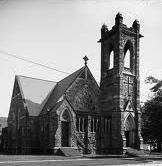From low-income housing to Saginaw’s first women’s health clinic, St. Paul’s has a long history of social justice work
By Elizabeth Morris Downie
DJO, Diocese of Eastern Michigan
Even before the creation in 1983 of “Jubilee Center” designations, St.
Paul’s Church, Saginaw, Mich., was deeply involved in the work of Jubilee.
The parish had sponsored the development of two urban low-income residences totaling over 200 units, operated an extensive feeding program, including Sunday dinner, and opened its facilities to numerous community organizations. The Welfare Rights Committee met there, and Planned Parenthood opened a clinic there also, becoming the first women’s health clinic in the City of Saginaw.

In the past 30 years, the specifics of mission and ministry have evolved, but the work of Jubilee remains central to St. Paul’s parish life.
So it was an easy “yes” to Bishop Coleman McGehee’s invitation to
The Rev. Bill Boli, rector, to apply for the Jubilee Center designation.
In the past 30 years, the specifics of mission and ministry have evolved, but the work of Jubilee remains central to St. Paul’s parish life.
Boli served two terms on the national Board of Jubilee Ministries, and also served “more years than I care to count” as the diocesan Jubilee minister.
Planned Parenthood has moved to its own clinic space, and the
ecumenical cooperation of a neighboring parish has faded, necessitating some reduction in the number of days the feeding program can be offered. But Sunday dinner is still a major event, with 15 different congregations hosting and serving the meal in rotation, while St. Paul’s provides crowd control and pastoral care. Absolutely all are welcome to this dinner.
In addition, bag lunches are offered three times a week; the lunches are furnished by the women of St. Thomas Aquinas Roman Catholic Church.
St. Paul’s also offers a School of Biblical Studies, with a particular
emphasis on Christian social interaction, addressing the issue of violence affecting the lives of those who come. There’s a food pantry, of course, and the “Healthy Futures Free Clinic,” staffed by Caroline Scott, MD, a very active member of the congregation, and a nurse from St. Mary’s Medical Center.
This clinic serves people without insurance, and offers HIV testing.
Along with this physical health care, the parish offers a healing meditation garden for spiritual healing.
Since there is no public transportation on weekends and very little in
the evening in the Saginaw, the parish worked to acquire a van to bring parishioners to services and to weeknight activities.
Always alert to the needs of the people it serves, St. Paul’s Church is
now exploring ways to address the difficulties many urban children have learning to read. The current rector, The Rev. Judith Boli, is a retired educator, and she is evaluating the potential of reading “toys” to help children learn that reading is not only possible, but fun.
“We are Church,” Judith Boli says. “Everything we do is centered around the altar.” And the centrality of faithful worship is resulting in growth; since 2008, average Sunday attendance has risen by 20 percent, to 98.
St. Paul’s welcomes those who are outcasts from other churches; people with developmental or emotional difficulties often cannot keep the code of quiet behavior expected in most churches, but they are welcome to stay as long as they don’t make so much noise that the rest of the congregation can’t hear the priest.
Children of all ages are present for the entire service. A
gospel choir provides enthusiastic musical leadership in a wide variety of styles, including rap, for worship.
Like many cities in Michigan, Saginaw has been hard hit by economic
downturns and loss of jobs, rising crime rates and a shrinking tax basis, but in the center of this city, St. Paul’s Episcopal Church is a beacon of hope and light, truly striving through the years to help Saginaw become a Jubilee city.
